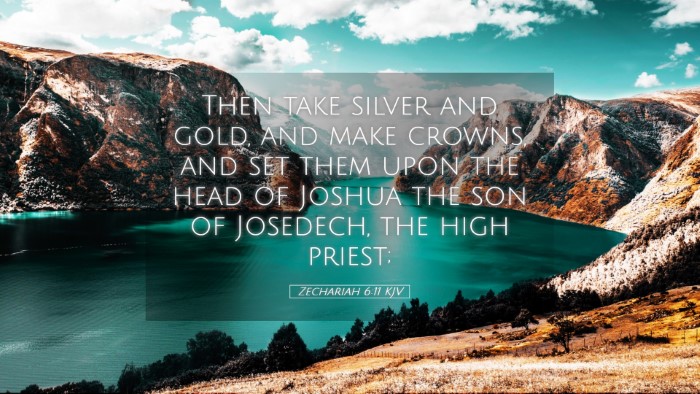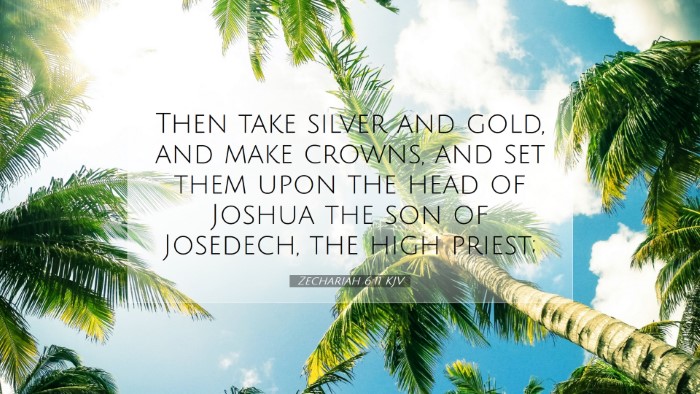Old Testament
Genesis Exodus Leviticus Numbers Deuteronomy Joshua Judges Ruth 1 Samuel 2 Samuel 1 Kings 2 Kings 1 Chronicles 2 Chronicles Ezra Nehemiah Esther Job Psalms Proverbs Ecclesiastes Song of Solomon Isaiah Jeremiah Lamentations Ezekiel Daniel Hosea Joel Amos Obadiah Jonah Micah Nahum Habakkuk Zephaniah Haggai Zechariah MalachiZechariah 6:11
Zechariah 6:11 KJV
Then take silver and gold, and make crowns, and set them upon the head of Joshua the son of Josedech, the high priest;
Zechariah 6:11 Bible Commentary
Commentary on Zechariah 6:11
Zechariah 6:11 states:
“Then take silver and gold, and make crowns, and set them upon the head of Joshua the son of Josedech, the high priest.”
Contextual Overview
This verse forms part of a series of visions received by the prophet Zechariah during a time of restoration for Israel following their Babylonian captivity. The vision signifies the unification of civil and religious authority, embodied in the person of Joshua, the high priest, as well as the forthcoming Messiah.
Historical Background
The post-exilic period was characterized by the Israelites' efforts to rebuild their temple and re-establish their nation. Following their return from exile, the Jewish community faced various challenges, including opposition from surrounding nations. God, through Zechariah, provides encouragement and prophetic insights into the future restoration and blessing of His people.
Key Themes
- Symbolism of Crowning: The crowning of Joshua symbolizes the dual roles of spiritual leadership and authority over the nation.
- Christological Implications: The verse foreshadows the coming Messiah, indicating that Joshua serves as a type of Christ.
- Unity of Priesthood and Kingship: The act establishes a linkage between the priestly and kingly offices, an essential theme in Zechariah’s message.
Commentary Insights
Matthew Henry’s Perspective
According to Matthew Henry, this crowning of Joshua signifies the union of Christ's dual natures—King and Priest. He emphasizes that while the Levites were tasked with the religious duties, the kingship was to emerge from the line of Judah, illustrating a unique interplay between these roles. Henry interprets the crowns as symbols not just of authority but of divine favor that extends to rejuvenating the nation of Israel.
Albert Barnes’ Reflection
Albert Barnes agrees with Henry's perception of the symbolism of crowns. He elaborates on the significance of placing these crowns upon Joshua's head, illustrating the idea that God's plans for redemption are mediated through chosen leaders. Barnes emphasizes the importance of this moment: it not only indicates Joshua’s exaltation but also serves as a prophetic foreshadowing of the everlasting kingdom of Jesus Christ, the ultimate High Priest and King.
Adam Clarke’s Analysis
Adam Clarke provides a detailed analysis of the materials involved, explaining that the choice of silver and gold crowns denotes value and holiness. He explains that in the ancient world, crowns were often given upon a person’s ascendancy and that in this case, it foreshadows the spiritual elevation that God's people would experience through their awaited Messiah. Clarke notes the significance of empowering the priesthood to signify that God holds authority over both spiritual and temporal realms.
Insight into Joshua’s Role
The crowning of Joshua as the high priest becomes a powerful symbol for prophetic fulfillment. The book of Zechariah ties the priestly functions of Joshua with the comingMessiah, emphasizing the dual roles aligned under God's sovereign plan. In historical and eschatological terms, Joshua not only represents the present leadership but serves as a precursor to Christ, who fulfills the office of both priest and king (Hebrews 7:17).
Implications for Leadership
The anointing of leaders within the church today can find parallel insights from this scripture. Spiritual leaders are called to lead as Joshua did, recognizing their role as elected vessels for God’s purpose. The joint expectation of civil and religious duties invites contemporary leaders to embrace a holistic approach to governance and spiritual affairs, essentially asserting that God’s kingdom encompasses all spheres of life.
Theological Reflection
This passage has profound theological implications as it reveals God's overarching plan for Israel, which continues to reflect His work within the Church today. Zechariah 6:11 emphasizes that God not only desires a nation of priests but also a people who live under the rule of Christ, thus representing His kingship on earth. These prophetic images resonate profoundly with New Testament believers, inviting introspection into their roles within God’s covenant community.
Concluding Thoughts
In conclusion, Zechariah 6:11 calls us to contemplate the significance of leadership in God’s kingdom, the dual roles of service, and the prophetic nature of our faith tradition which anticipates the ultimate realization through Jesus Christ. As we reflect on this passage, we are reminded of the importance of remaining unified within the Body of Christ and recognizing our call to live out His kingdom work in our communities.


